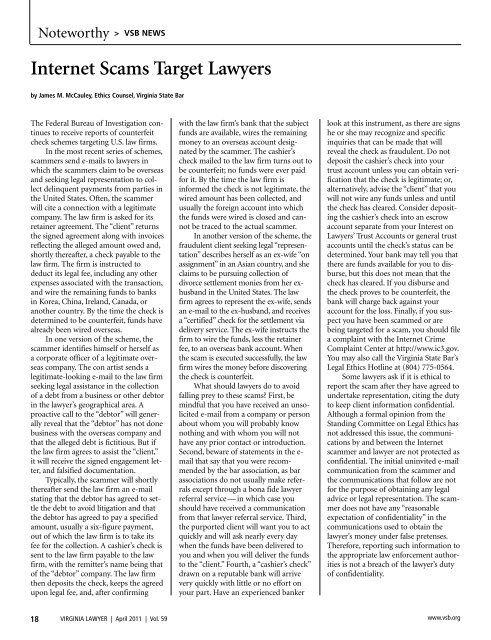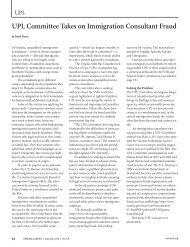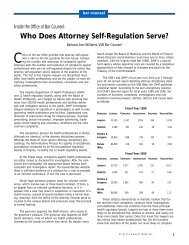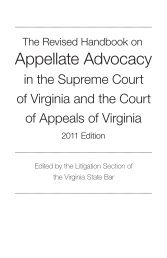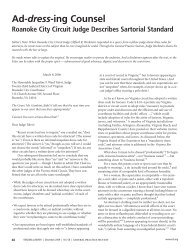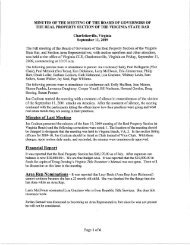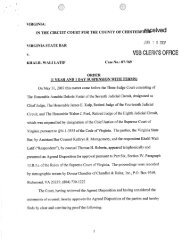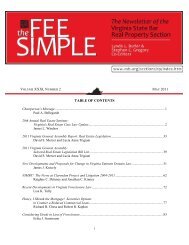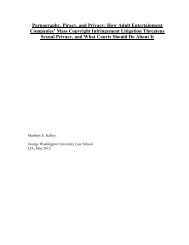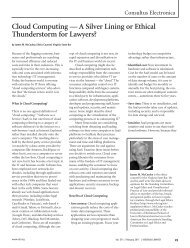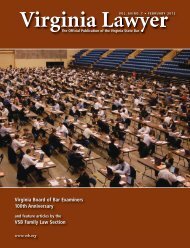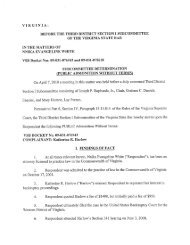Thomas Jefferson, Religious Freedom ... - Virginia State Bar
Thomas Jefferson, Religious Freedom ... - Virginia State Bar
Thomas Jefferson, Religious Freedom ... - Virginia State Bar
Create successful ePaper yourself
Turn your PDF publications into a flip-book with our unique Google optimized e-Paper software.
18<br />
Noteworthy > VSB NEWS<br />
Internet Scams Target Lawyers<br />
by James M. McCauley, Ethics Counsel, <strong>Virginia</strong> <strong>State</strong> <strong>Bar</strong><br />
The Federal Bureau of Investigation continues<br />
to receive reports of counterfeit<br />
check schemes targeting U.S. law firms.<br />
In the most recent series of schemes,<br />
scammers send e-mails to lawyers in<br />
which the scammers claim to be overseas<br />
and seeking legal representation to collect<br />
delinquent payments from parties in<br />
the United <strong>State</strong>s. Often, the scammer<br />
will cite a connection with a legitimate<br />
company. The law firm is asked for its<br />
retainer agreement. The “client” returns<br />
the signed agreement along with invoices<br />
reflecting the alleged amount owed and,<br />
shortly thereafter, a check payable to the<br />
law firm. The firm is instructed to<br />
deduct its legal fee, including any other<br />
expenses associated with the transaction,<br />
and wire the remaining funds to banks<br />
in Korea, China, Ireland, Canada, or<br />
another country. By the time the check is<br />
determined to be counterfeit, funds have<br />
already been wired overseas.<br />
In one version of the scheme, the<br />
scammer identifies himself or herself as<br />
a corporate officer of a legitimate overseas<br />
company. The con artist sends a<br />
legitimate-looking e-mail to the law firm<br />
seeking legal assistance in the collection<br />
of a debt from a business or other debtor<br />
in the lawyer’s geographical area. A<br />
proactive call to the “debtor” will generally<br />
reveal that the “debtor” has not done<br />
business with the overseas company and<br />
that the alleged debt is fictitious. But if<br />
the law firm agrees to assist the “client,”<br />
it will receive the signed engagement letter,<br />
and falsified documentation.<br />
Typically, the scammer will shortly<br />
thereafter send the law firm an e-mail<br />
stating that the debtor has agreed to settle<br />
the debt to avoid litigation and that<br />
the debtor has agreed to pay a specified<br />
amount, usually a six-figure payment,<br />
out of which the law firm is to take its<br />
fee for the collection. A cashier’s check is<br />
sent to the law firm payable to the law<br />
firm, with the remitter’s name being that<br />
of the “debtor” company. The law firm<br />
then deposits the check, keeps the agreed<br />
upon legal fee, and, after confirming<br />
VIRGINIA LAWYER | April 2011 | Vol. 59<br />
with the law firm’s bank that the subject<br />
funds are available, wires the remaining<br />
money to an overseas account designated<br />
by the scammer. The cashier’s<br />
check mailed to the law firm turns out to<br />
be counterfeit; no funds were ever paid<br />
for it. By the time the law firm is<br />
informed the check is not legitimate, the<br />
wired amount has been collected, and<br />
usually the foreign account into which<br />
the funds were wired is closed and cannot<br />
be traced to the actual scammer.<br />
In another version of the scheme, the<br />
fraudulent client seeking legal “representation”<br />
describes herself as an ex-wife “on<br />
assignment” in an Asian country, and she<br />
claims to be pursuing collection of<br />
divorce settlement monies from her exhusband<br />
in the United <strong>State</strong>s. The law<br />
firm agrees to represent the ex-wife, sends<br />
an e-mail to the ex-husband, and receives<br />
a “certified” check for the settlement via<br />
delivery service. The ex-wife instructs the<br />
firm to wire the funds, less the retainer<br />
fee, to an overseas bank account. When<br />
the scam is executed successfully, the law<br />
firm wires the money before discovering<br />
the check is counterfeit.<br />
What should lawyers do to avoid<br />
falling prey to these scams? First, be<br />
mindful that you have received an unsolicited<br />
e-mail from a company or person<br />
about whom you will probably know<br />
nothing and with whom you will not<br />
have any prior contact or introduction.<br />
Second, beware of statements in the email<br />
that say that you were recommended<br />
by the bar association, as bar<br />
associations do not usually make referrals<br />
except through a bona fide lawyer<br />
referral service — in which case you<br />
should have received a communication<br />
from that lawyer referral service. Third,<br />
the purported client will want you to act<br />
quickly and will ask nearly every day<br />
when the funds have been delivered to<br />
you and when you will deliver the funds<br />
to the “client.” Fourth, a “cashier’s check”<br />
drawn on a reputable bank will arrive<br />
very quickly with little or no effort on<br />
your part. Have an experienced banker<br />
look at this instrument, as there are signs<br />
he or she may recognize and specific<br />
inquiries that can be made that will<br />
reveal the check as fraudulent. Do not<br />
deposit the cashier’s check into your<br />
trust account unless you can obtain verification<br />
that the check is legitimate; or,<br />
alternatively, advise the “client” that you<br />
will not wire any funds unless and until<br />
the check has cleared. Consider depositing<br />
the cashier’s check into an escrow<br />
account separate from your Interest on<br />
Lawyers’ Trust Accounts or general trust<br />
accounts until the check’s status can be<br />
determined. Your bank may tell you that<br />
there are funds available for you to disburse,<br />
but this does not mean that the<br />
check has cleared. If you disburse and<br />
the check proves to be counterfeit, the<br />
bank will charge back against your<br />
account for the loss. Finally, if you suspect<br />
you have been scammed or are<br />
being targeted for a scam, you should file<br />
a complaint with the Internet Crime<br />
Complaint Center at http://www.ic3.gov.<br />
You may also call the <strong>Virginia</strong> <strong>State</strong> <strong>Bar</strong>’s<br />
Legal Ethics Hotline at (804) 775-0564.<br />
Some lawyers ask if it is ethical to<br />
report the scam after they have agreed to<br />
undertake representation, citing the duty<br />
to keep client information confidential.<br />
Although a formal opinion from the<br />
Standing Committee on Legal Ethics has<br />
not addressed this issue, the communications<br />
by and between the Internet<br />
scammer and lawyer are not protected as<br />
confidential. The initial uninvited e-mail<br />
communication from the scammer and<br />
the communications that follow are not<br />
for the purpose of obtaining any legal<br />
advice or legal representation. The scammer<br />
does not have any “reasonable<br />
expectation of confidentiality” in the<br />
communications used to obtain the<br />
lawyer’s money under false pretenses.<br />
Therefore, reporting such information to<br />
the appropriate law enforcement authorities<br />
is not a breach of the lawyer’s duty<br />
of confidentiality.<br />
www.vsb.org


